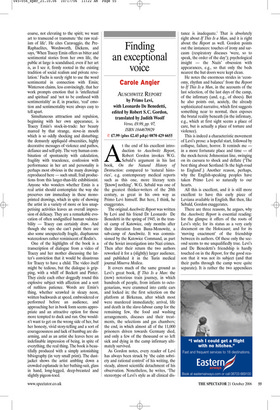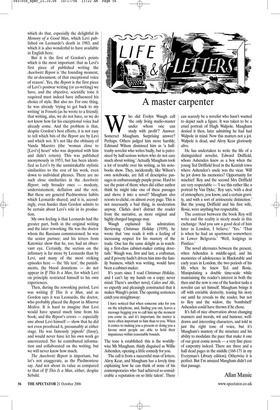Finding an exceptional voice
Carole Angier
AUSCHWITZ REPORT by Primo Levi, with Leonardo De Benedetti, edited by Robert S.C. Gordon, translated by Judith Woolf Verso, £9.99, pp. 97, ISBN 1844670929 ✆ £7.99 (plus £2.45 p&p) 0870 429 6655 At the end of his excellent introduction to Auschwitz Report, Robert Gordon invokes W.G. Sebald’s argument in his last book, On the Natural History of Destruction: compared to ‘natural histories’, e.g. contemporary medical reports such as this one, more literary texts ‘[know] nothing’. W.G. Sebald was one of the greatest thinker-writers of the 20th century, as great in his own way as Primo Levi himself. But here, I think, he exaggerates.
The original Auschwitz Report was written by Levi and his friend Dr Leonardo De Benedetti in the spring of 1945, in the transit camp of Katowice, only months after their liberation from Buna-Monowitz, a sub-camp of Auschwitz. It was commissioned by the Katowice Command, as part of the Soviet investigation into Nazi crimes. Then after their return the two authors reworked it for a (slightly) larger audience, and published it in the Turin medical journal Minerva Medica.
It covers much of the same ground as Levi’s great book, If This Is a Man: the (now) notorious train journey, in which hundreds of people, from infants to octogenarians, were crammed into cattle cars and locked in; the first selection on the platform at Birkenau, after which most were murdered immediately; arrival, life and death in the slave-labour camp for the remaining few, the food and washing arrangements, diseases and their treatments, the selections and gas chambers; the end, in which almost all of the 11,000 prisoners driven towards Germany died, and only a few of the thousand or so left sick and dying in the camp infirmary ultimately survived.
As Gordon notes, every reader of Levi has always been struck by ‘the calm sobriety and rational control’ of his writing, the steady, almost scientific detachment of his observation. Nonetheless, he writes, ‘The stereotype of Levi’s style as all clinical dis tance is inadequate.’ That is absolutely right about If This Is a Man, and it is right about the Report as well. Gordon points out the instances: touches of irony and sarcasm (respiratory diseases ‘were, so to speak, the order of the day’); psychological insight — the Nazis’ obsession with appearances, e.g., so that only the beds nearest the hut doors were kept clean.
He notes the enormous strides in ‘economy, rhythm and balance’ from the Report to If This Is a Man, in the accounts of the last selection, of the last days of the camp, of the infirmary (and, e.g., of shoes). But he also points out, acutely, the already sophisticated narrative, which first suggests something near to normal, then exposes the brutal reality beneath (in the infirmary, e.g., which at first sight seems a place of care, but is actually a place of torture and violence).
This is indeed a characteristic movement of Levi’s prose: a hopeful start, followed by collapse, failure, horror. It reminds me in a more fortunate place and time — of the mock-heroic Johnsonian line, swinging on its caesura to shock and deflate (‘The best thing about Scotland/Is the high-road to England’.) Another reason, perhaps, why the English-speaking peoples have taken Primo Levi so naturally to our hearts.
All this is excellent, and it is still more excellent to have this early piece of Leviana available in English. But then, like Sebald, Gordon exaggerates.
There are three reasons, he argues, why the Auschwitz Report is essential reading: for the glimpse it offers of the roots of Levi’s style; for its status as a very early document on the Holocaust; and for its ‘moving enactment’ of the friendship between its authors. Of these only the second seems to me unqualifiedly true. Levi’s and De Benedetti’s friendship is hardly touched on in the Report, for the good reason that it was not its subject (and that their paths through the camp were quite separate). It is rather the two appendices which do that, especially the delightful In Memory of a Good Man, which Levi published on Leonardo’s death in 1983, and which it is also wonderful to have available in English here.
But it is the first of Gordon’s points which is the most important: that as Levi’s first piece of published writing the Auschwitz Report is ‘the founding moment, the ur-document, of that exceptional voice of reason’. Yes, the Report is the first piece of Levi’s postwar writing (or co-writing) we have, and the objective, scientific tone it required must indeed have influenced his choice of style. But also no. For one thing, he was already ‘trying to get back to my writing’ in Fossoli (as he wrote to a friend); that writing, alas, we do not have, so we do not know how far his exceptional voice had already come. And the problem is that, despite Gordon’s best efforts, it is not easy to tell which bits of the Report are by Levi and which not. It’s not like the obituary of Vanda Maestro (the ‘woman close to [Levi’s] heart’ who was deported with him and didn’t return). This was published anonymously in 1953, but has been identified as Levi’s by the unmistakable stylistic similarities to the rest of his work, even down to individual phrases. There are no such close similarities in the Auschwitz Report; only broader ones — modesty, understatement, deflation and the rest. But these are general Piedmontese habits which Leonardo shared; and it is, accordingly, even harder than Gordon admits to be certain about Levi’s role in its production.
My own feeling is that Leonardo had the greater part, both in the original writing and the later reworking. He was the doctor whom the Russians commissioned; he was the senior partner; and his letters from Katowice show that he, too, had an observant eye. Certainly, the section on the infirmary is far more by Leonardo than by Levi, and many of the most striking episodes here — the ‘life test’, the punishments, the blood donations — do not appear in If This Is a Man, for which Levi on principle restricted himself to his own experiences.
Then, during the reworking period, Levi was writing If This Is a Man, and as Gordon says it was Leonardo, the doctor, who probably placed the Report in Minerva Medica. It is hard to imagine that Levi would have spared much time from his book; and the Report’s errors — especially one about Levi himself — show that he did not even proofread it, presumably at either stage. He was famously ‘pignolo’ (fussy), and would never have let his own work go uncorrected. No: he contributed information and collaborated on the writing, but we will never know how much.
The Auschwitz Report is important, but let’s not exaggerate, as the Piedmontese say. And not about its value as compared to that of If This Is a Man, either, despite Sebald.



































































































 Previous page
Previous page